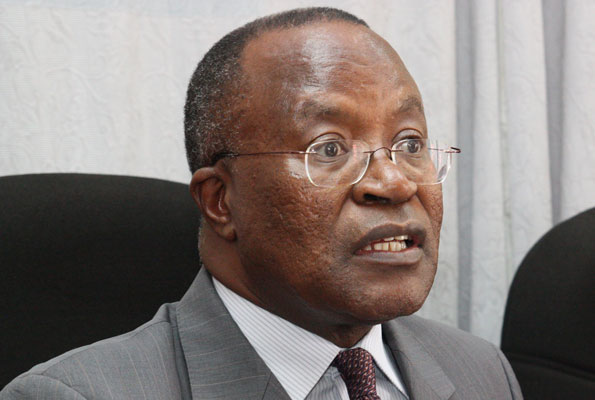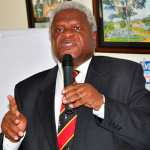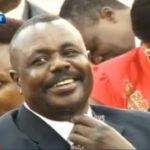Dr James Nsaba Buturo
Born in 1951 in Kisoro, Dr James NsabaButuro studied at Makerere University where he graduated with a Bachelor of Arts degree in Political Science and Public Administration. He also has a Mastersdegree and Doctorate in Development Administration from Birmingham University in the United Kingdom. He joined the civil service in Uganda as a District Commissioner in the local government ministry in 1977 and by 1983 was the much-feared District Commissioner of Kampala under the Obote II regime.
After the overthrow of Obote, NsabaButuro fled to the United Kingdom, where he lived from 1989 up to 1995. In 1999 he returned to Uganda and joined politics in 2001, winning the Bufumbira County East constituency. At the time he also served as the State Minister for Information.
He was re-elected in 2006, and after some time transferred to the Ethics and Integrity State Minister, but when he lost his seat in 2011, he left cabinet.
Cyprian Bamwoze
A retired Bishop of Busoga diocese, Cyprian Bamwoze openly supported Obote and the Uganda People’s Congress and in 2001, while in retirement, campaigned for presidential aspirant AggreyAwori, a renowned UPC then.
Emmanuel Cardinal Nsubuga
Emmanuel Cardinal Kiwanuka Nsubuga was born in 1914 and was the first Archbishop of the Archdiocese of Kampala from 1966 to 1990.
During Amin’s regime Cardinal Nsubuga spoke against the government’s human rights abuses and later during the war between Museveni’s NRA and Obote’s UNLA, he encouraged Catholic clergy across the country to shelter people fleeing harassment by the army. He died in 1991.
Emmanuel Cardinal Wamala
Emmanuel Cardinal Wamala was born in Lwamaggwa, Masaka in 1926, ordained priest in December 1957, and served in various places before being named Cardinal.
Currently aged 87, Cardinal Wamala is retired and was succeeded in Kampala Archdiocese by Archbishop Cyprian KizitoLwanga.
Sheikh Abdulrazak Matovu
Born around 1931, Sheikh AbdulrazakMatovu was the first Chief Khadhi of the Uganda Muslim Supreme Council (UMSC) in 1972.
An academic, he went to Pakistan in 1956 and studied Islamic Studies for five years, returning to Uganda in 1961. He also reportedly translated the Quran from Arabic to Luganda and was the first African to become an Executive Committee member of the World Muslim League in Saudi Arabia.
Sheikh Kassim Mulumba
Sheikh KassimMulumba was appointed acting Mufti after the overthrow of Amin in 1979 at the instigation of the internal affairs minister Paulo Muwanga, courting trouble for himself when he exceeded the six months he was supposed to act as Mufti.
Sheikh Obed Kamulegeya
Born in Butambala, Gomba, ShiekhObedKamulegeya was one time a Mufti of the Uganda Muslim Supreme Council in the mid 1980s. He was the first deputy president of the National Association of the Advancement of Muslims (NAAM), an association formed by Milton Obote’s UPC in the 1960s to pacify Muslims in Uganda. He was also one time deputy Mufti under Mulumba, after the two were reconcioled by Prince BadruKakungulu. Sheikh Kamulegeya pays allegiance to the Kibulifaction of the Muslim community in Uganda and was instrumental in denouncing the election of Sheikh RamadhanMubajje as Mufti.
Sheikh Ali Saad Islam Kulumba
He was one time the Speaker of the Buganda Lukiiko and first Deputy Mufti of the Uganda Muslim Supreme Council (UMSC). He passed on in 2004.
Prince Badru Kakungulu
Prince BadruKakunguluWassajja was born in 1907, into the royal family of Prince NuhuMbogo. He was a very influential Muslim leader and was responsible for the construction of the Islamic schools in Kibuli. He passed on in 1991 aged 84.
Sheikh Hussein Rajab Kakooza
Sheikh Hussein Rajab Kakooza was elected as a ‘compromise’ Mufti after Sheikh ObedKamulegeya and SaadLuwemba failed to resolve their long-standing differences.
Sheikh Saad Ibrahim Luwemba
He was one time the Mufti of Uganda and died in 1997.










